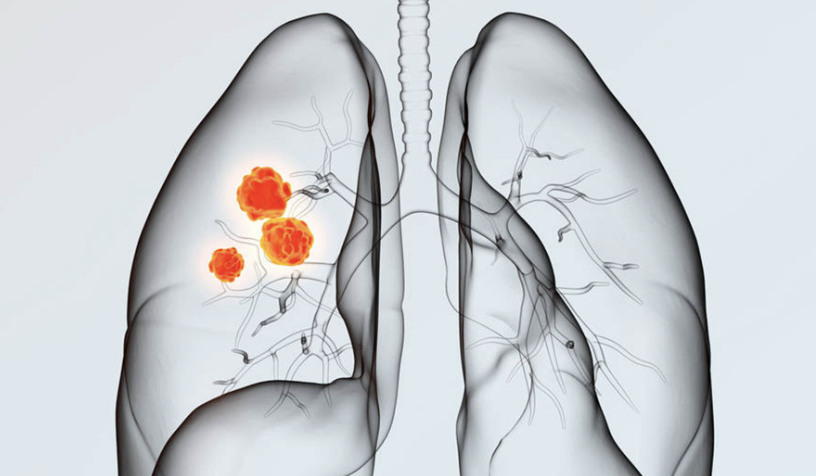Medical
More Significant Survival Benefit For Non-Small Cell Lung Cancer Patients Under 55 Years Of Age, Also Using Immunotherapy!
Recent findings show that the use of cutting-edge immune checkpoint inhibitor therapy (referred to as immunotherapy in this article) has increased rapidly over the past decade in the population of patients with advanced non-small cell lung cancer (NSCLC), but the survival benefit is more pronounced in younger people than in older people, who have limited survival benefit with this therapy.

Recent findings show that the use of cutting-edge immune checkpoint inhibitor therapy (referred to herein as immunotherapy), which has increased rapidly in the last decade in the advanced non-small cell lung cancer (NSCLC) patient population, has had limited survival benefits in older people compared to younger people, who have more significant survival benefits with this therapy.

"We found that within a few years of introducing immunotherapy to the market, more than half of lung cancer patients, regardless of age, were receiving these treatments," Dr. Gross, professor of medicine at Yale University School of Medicine in New Haven, Connecticut, said in an interview. "But we also found that while survival rates increased substantially in younger patients, there was little change in survival rates among older people. This suggests that we need to look more closely at whether older people are actually benefiting from such novel therapies."

"Exciting new drugs"
More than 20 new drugs have been approved by the U.S. Food and Drug Administration (FDA) for the treatment of NSCLC, according to research published in JAMA Oncology.The increase in treatment options for NSCLC patients may reduce lung cancer mortality in the U.S.
"These are exciting new drugs that are already being used rapidly in the clinical treatment of cancer patients," said Gross. "This is true for patients of all ages, and to be fair, checkpoint inhibitors have become one of the standard lung cancer treatments for both younger and older patients."
Gross and colleagues analysed data from 71,968 patients from about 53 community clinics in the US who were all patients with NSCLC.

"The majority of cancer patients were over the age of 65," Gross said. "We can think of cancer as a disease associated with ageing. That's why our research team is particularly interested in the older population and wants to understand the risks and benefits of new cancer treatments in the older patient population."
As medicine has evolved, the proportion of patients receiving targeted cancer therapies has increased from 69% in 2011 to 77.2% in 2019; and when the FDA approved the first immune checkpoint inhibitors for the treatment of NSCLC, the use of such immunotherapies increased from 4.7% in 2015 to 45.6% in 2019, a very rapid rate of growth, and both 55 patients under the age of 55 or 75 and older, the proportion of immunotherapy use was very similar (45.2% and 43.8%).
Changes in survival rates due to immunotherapy
From 2011 to 2018, the 2-year survival rate for patients under 55 years of age increased from 37.7% to 50.3%. In contrast, the 2-year survival rate increased only slightly in patients aged 75 years and over (30.6% vs 36.2%).
In addition, mean survival increased from 11.5 to 16 months for patients under 55 years of age and from 9.1 to 10.2 months for patients 75 years and older during the period the study was conducted.
"Our study is not designed to answer why survival and survival benefit is not higher in older patients, but it is crucial to understand the reasons behind this phenomenon," said Gross.

"This may be due to the shorter overall life expectancy of the elderly, who have a different risk of immunotherapy (side effects) than younger people. In the future, we need to redesign the research system and put more effort into older patients undergoing immunotherapy or we will never get answers."
-
![]()
![]() MedicalFeb 02, 2026
MedicalFeb 02, 2026New Research: Cracking The Targeted Drug Resistance Puzzle And Eliminating Cancer Cells Before They Evolve!
-
![]()
![]() MedicalFeb 01, 2026
MedicalFeb 01, 2026How should I choose the first, second and third generation test tube babies?
-
![]()
![]() MedicalJan 31, 2026
MedicalJan 31, 2026K-Drug Approved For Adjuvant Treatment Of Early-Stage Non-Small Cell Lung Cancer, Significantly Extending Cancer-Free Survival Of Patients!
-
![]()
![]() MedicalJan 30, 2026
MedicalJan 30, 2026Study Shows Drug Halves Recurrence Rate In Patients With Early-Stage EGFR-Mutated Lung Cancer!
-
![]()
![]() MedicalJan 29, 2026
MedicalJan 29, 2026New Technology Can Break The Blood-Brain Barrier To Directly Treat Brain Tumours, Is Potent And Less Toxic, And Deserves Attention!




